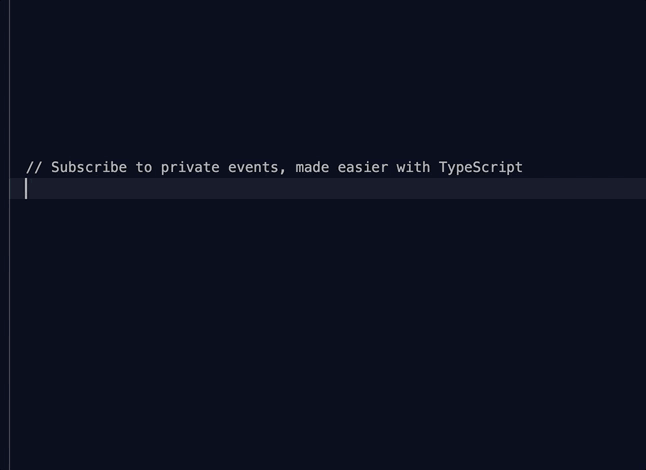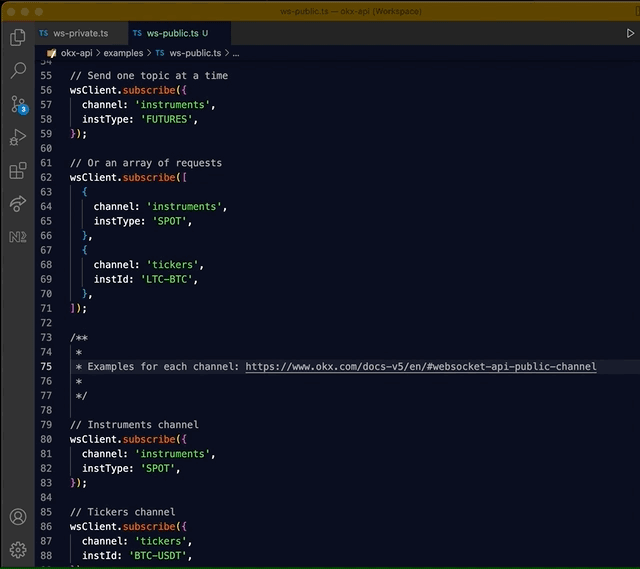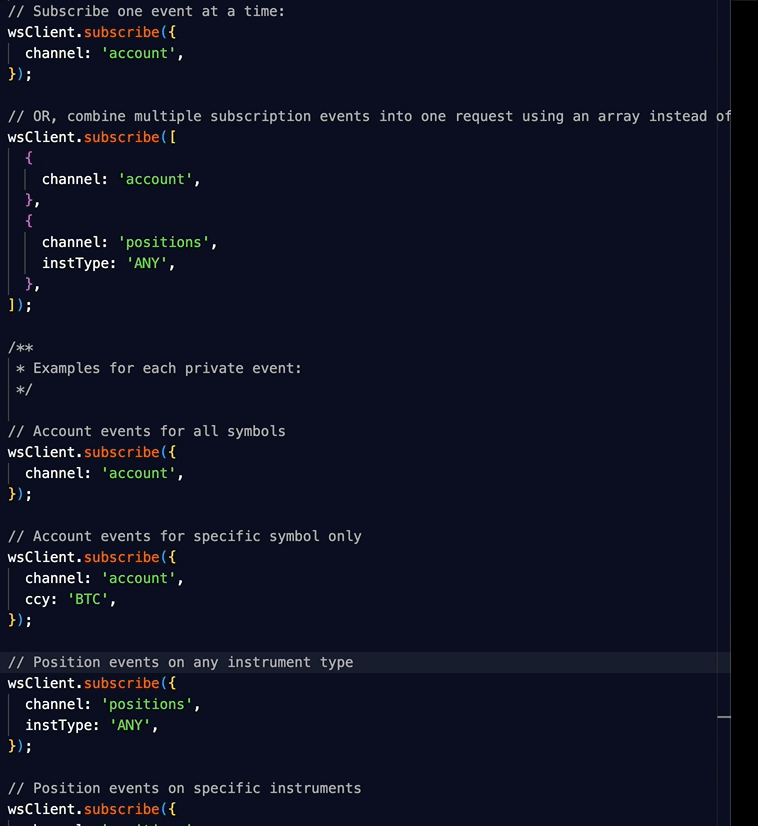Node.js & Typescript OKX (OKEX) API & WebSocket SDK
Complete, updated & performant Node.js SDK for the OKX(OKEX) APIs and WebSockets:
- Complete integration with OKX REST APIs, WebSockets & WebSocket APIs.
- TypeScript support (with type declarations for most API requests & responses).
- Over 100 end-to-end tests making real API calls & WebSocket connections, validating any changes before they reach npm.
- Supports all available OKX regions:
- OKX Global (www.okx.com), by default.
- OKX EEA (my.okx.com), by setting
market: 'EEA'. - OKX US (app.okx.com), by setting
market: 'US'.
- Actively maintained with a modern, promise-driven interface.
- Robust WebSocket integration
- Configurable connection heartbeats (automatically detect failing connections).
- Automatic reconnect then resubscribe workflows.
- Automatic authentication and heartbeat handling.
- Supports WebSocket API in all supported regions & product groups:
- Use the WebsocketClient's event-driven
sendWSAPIRequest()method, or; - Use the WebsocketAPIClient for a REST-like experience.
- Use the WebSocket API like a REST API!
- Automatic routing to business vs private WebSocket endpoints.
- End to end types.
- See examples/ws-api-client.ts for a demonstration.
- Use the WebsocketClient's event-driven
- Browser support (via webpack bundle - see "Browser Usage" below).
Table of Contents
- Installation
- Issues & Discussion
- Related Projects
- Documentation
- Contributions & Thanks
- Structure
- Usage
- Browser/Frontend Usage
- Use with LLMs & AI
- Contributions & Pull Requests
- Used By
- Star History
Installation
npm install okx-apiIssues & Discussion
- Issues? Check the issues tab.
- Discuss & collaborate with other node devs? Join our Node.js Algo Traders engineering community on telegram.
- Follow our announcement channel for real-time updates on X/Twitter
Related Projects
Check out my related JavaScript/TypeScript/Node.js projects:
- Try my REST API & WebSocket SDKs:
- Try my misc utilities:
- Check out my examples:
Documentation
Most methods accept JS objects. These can be populated using parameters specified by okx's API documentation, or check the type definition in the rest-client class methods.
Contributions & Thanks
Support my efforts to make algo trading accessible to all - register with my referral links:
For more ways to give thanks & support my efforts, visit Contributions & Thanks!
Structure
This project uses typescript. Resources are stored in 3 key structures:
- src - the whole connector written in typescript
- lib - the javascript version of the project (compiled from typescript). This should not be edited directly, as it will be overwritten with each release. This is also the version published to npm.
- dist - the packed bundle of the project for use in browser environments (manual, using webpack).
- examples - some implementation examples & demonstrations. Contributions are welcome!
Usage
Create API credentials at okx
REST Client
Requests & Responses
- If your IDE doesn't have IntelliSense, check the rest-client.ts for a list of methods, params & return types.
- Requests follow the same ordering and format as the categories in the API docs.
- Responses are parsed automatically for less nesting. Error responses are thrown in full:
- If the response looks successful (HTTP 200 and "code" in the response body === "0"), only the
dataproperty is directly (without thecode,data&msgproperties). - If the response looks like an error (HTTP error OR the "code" property in the response does not equal "0"), the full response is thrown (including
codeandmsgproperties). See the interface for APIResponse<T>.
- If the response looks successful (HTTP 200 and "code" in the response body === "0"), only the
Example
import { RestClient } from 'okx-api';
const client = new RestClient({
apiKey: 'apiKeyHere',
apiSecret: 'apiSecretHere',
apiPass: 'apiPassHere',
// For Global users (www.okx.com), you don't need to set the market.
// It will use global by default.
// Not needed: market: 'GLOBAL',
// For EEA users (my.okx.com), set market to "EEA":
// market: 'EEA',
// For US users (app.okx.com), set market to "US":
// market: 'US',
});
// Submit a buy and sell market order
(async () => {
try {
const allBalances = await client.getBalance();
console.log('All balances: ', allBalances);
const buyResult = await client.submitOrder({
instId: 'BTC-USDT',
ordType: 'market',
side: 'buy',
sz: '0.1',
tdMode: 'cash',
tgtCcy: 'base_ccy',
});
console.log('buy order result: ', buyResult);
const sellResult = await client.submitOrder({
instId: 'BTC-USDT',
ordType: 'market',
side: 'sell',
sz: '0.1',
tdMode: 'cash',
tgtCcy: 'base_ccy',
});
console.log('Sell order result: ', sellResult);
} catch (e) {
console.error('request failed: ', e);
}
})();WebSockets
This connector includes a high-performance Node.js, TypeScript & JavaScript WebSocket client for the OKX public & private WebSocket, including the OKX WebSocket API for order placement. API credentials are optional unless private streams will be used (such as account order updates).
- If your IDE doesn't have IntelliSense, check the websocket-client.ts for a list of methods, params & return types.
- When subscribing to channels, only the "args" should be passed as an object or array when calling the websocket client subcribe() function: API docs.
- TypeScript recommended (but it is not required) for a richer experience:

- The ws client will automatically open connections as needed when subscribing to a channel.
- If the connection is lost for any reason, the ws client will detect this (via the connection heartbeats). It will then:
- Automatically teardown the dead connection.
- Automatically respawn a fresh connection.
- Automatically reauthenticate, if using private channels.
- Automatically resubscribe to previously subscribed topics.
- Resume producing events as before, without extra handling needed in your logic.
- The ws client will automatically authenticate if accounts are provided and a private channel is subscribed to.
- Up to 100 accounts are supported on the private connection, as per the API docs. Authentication is automatic if accounts are provided.
- For examples in using the websocket client, check the examples in the repo:
- Private channels (account data): examples/ws-private.ts
- Public chanels (market data): examples/ws-public.ts
- These examples are written in TypeScript, so can be executed with ts-node for easy testing:
ts-node examples/ws-private.ts - Or convert them to javascript:
- Change the
import { ... } from 'okx-api'toconst { ... } = require('okx-api'); - Rename the file to
ws-private.js - And execute with node:
node examples/ws-private.js
- Change the
Sending orders via WebSockets
OKX supports some order management capabilities via a persisted WebSocket connection. This SDK supports this with two convenient approaches.
The recommended route is to use the dedicated WebsocketAPIClient class, included with this SDK:
- Dedicated functions for every available WebSocket API operation
- Fully typed requests and responses
- Asynchronous promisified wrapper around WS API commands.
It looks & feels like a REST API client, but uses WebSockets, via the WebsocketClient's sendWSAPIRequest method (which you can use directly if you prefer).
A simple example is below but for a more thorough example, check the example here: ./examples/ws-api-client.ts.
import { WebsocketAPIClient } from 'okx-api';
// or if you prefer require:
// const { WebsocketAPIClient } = require("okx-api");
// For private events, all 3 of the following are required (per account):
const API_KEY = process.env.API_KEY_COM;
const API_SECRET = process.env.API_SECRET_COM;
const API_PASSPHRASE = process.env.API_PASSPHRASE_COM;
// If running from CLI in unix, you can pass env vars as such:
// API_KEY_COM='lkm12n3-2ba3-1mxf-fn13-lkm12n3a' API_SECRET_COM='035B2B9637E1BDFFEE2646BFBDDB8CE4' API_PASSPHRASE_COM='ComplexPa$$!23$5^' ts-node examples/ws-private.ts
const wsClient = new WebsocketAPIClient({
// For Global users (www.okx.com), you don't need to set the market.
// It will use global by default.
// Not needed: market: 'GLOBAL',
// For EEA users (my.okx.com), set market to "EEA":
// market: 'EEA',
// For US users (app.okx.com), set market to "US":
// market: 'US',
accounts: [
{
apiKey: API_KEY,
apiSecret: API_SECRET,
apiPass: API_PASSPHRASE,
},
],
});
async function start() {
// Optional: prepare the WebSocket API connection in advance.
// This happens automatically but you can do this early before making any API calls, to prevent delays from a cold start.
// await wsClient.connectWSAPI();
/**
* OKX's WebSocket API be used like a REST API, through this SDK's WebsocketAPIClient. The WebsocketAPIClient is a utility class wrapped around WebsocketClient's sendWSAPIRequest() capabilities.
*
* Each request sent via the WebsocketAPIClient will automatically:
* - route via the active WS API connection
* - return a Promise, which automatically resolves/rejects when a matching response is received
*/
/**
* Place Order
* https://www.okx.com/docs-v5/en/#order-book-trading-trade-ws-place-order
*/
try {
const res = await wsClient.submitNewOrder({
instId: 'BTC-USDT',
tdMode: 'cash',
side: 'buy',
ordType: 'market',
sz: '100',
});
/**
const res = {
id: '2',
op: 'order',
code: '1',
msg: '',
data: [
{
tag: '159881cb7207BCDE',
ts: '1753714603721',
ordId: '',
clOrdId: '',
sCode: '51008',
sMsg: 'Order failed. Insufficient USDT balance in account.'
}
],
inTime: '1753714603720755',
outTime: '1753714603721942',
wsKey: 'prodPrivate',
isWSAPIResponse: false
}
const res = {
id: '2',
op: 'order',
code: '1',
msg: '',
data: [
{
tag: '159881cb7207BCDE',
ts: '1753714567149',
ordId: '',
clOrdId: '',
sCode: '51010',
sMsg: "You can't complete this request under your current account mode."
}
],
inTime: '1753714567149196',
outTime: '1753714567149913',
wsKey: 'prodPrivate',
isWSAPIResponse: false
}
*/
console.log(new Date(), 'WS API "submitNewOrder()" result: ', res);
} catch (e) {
console.error(new Date(), 'Exception with WS API "submitNewOrder()": ', e);
}
/**
* Submit multiple orders in a batch
* https://www.okx.com/docs-v5/en/#order-book-trading-trade-ws-place-multiple-orders
*/
try {
const res = await wsClient.submitMultipleOrders([
{
instId: 'BTC-USDT',
tdMode: 'cash',
side: 'buy',
ordType: 'market',
sz: '100',
},
{
instId: 'BTC-USDT',
tdMode: 'cash',
side: 'buy',
ordType: 'market',
sz: '50',
},
]);
console.log(new Date(), 'WS API "submitMultipleOrders()" result: ', res);
} catch (e) {
console.error(
new Date(),
'Exception with WS API "submitMultipleOrders()": ',
e,
);
}
}
start();Receiving realtime data
The below example demonstrates connecting as a consumer, to receive WebSocket events from OKX, using the included WebsocketClient:
import { WebsocketClient } from 'okx-api';
// or if you prefer require:
// const { WebsocketClient } = require("okx-api");
// For private events, all 3 of the following are required (per account):
const API_KEY = process.env.API_KEY_COM;
const API_SECRET = process.env.API_SECRET_COM;
const API_PASSPHRASE = process.env.API_PASSPHRASE_COM;
// If running from CLI in unix, you can pass env vars as such:
// API_KEY_COM='lkm12n3-2ba3-1mxf-fn13-lkm12n3a' API_SECRET_COM='035B2B9637E1BDFFEE2646BFBDDB8CE4' API_PASSPHRASE_COM='ComplexPa$$!23$5^' ts-node examples/ws-private.ts
// Note the single quotes, preventing special characters such as $ from being incorrectly passed
const wsClient = new WebsocketClient({
// For Global users (www.okx.com), you don't need to set the market.
// It will use global by default.
// Not needed: market: 'GLOBAL',
// For EEA users (my.okx.com), set market to "EEA":
// market: 'EEA',
// For US users (app.okx.com), set market to "US":
// market: 'US',
accounts: [
// For private topics, include one or more accounts in an array. Otherwise only public topics will work
{
apiKey: API_KEY,
apiSecret: API_SECRET,
apiPass: API_PASSPHRASE,
},
// {
// apiKey: 'yourApiKeyHere',
// apiSecret: 'yourApiSecretHere',
// apiPass: 'yourApiPassHere',
// },
// {
// apiKey: 'anotherAccountKey',
// apiSecret: 'anotherAccountSecret',
// apiPass: 'anotherAccountPass',
// },
],
});
// Raw data will arrive on the 'update' event
wsClient.on('update', (data) => {
console.log('ws update (raw data received)', JSON.stringify(data));
});
wsClient.on('open', (data) => {
console.log('connection opened open:', data.wsKey);
});
// Replies (e.g. authenticating or subscribing to channels) will arrive on the 'response' event
wsClient.on('response', (data) => {
// console.log('ws response: ', JSON.stringify(data, null, 2));
console.log('ws response: ', JSON.stringify(data));
});
wsClient.on('reconnect', ({ wsKey }) => {
console.log('ws automatically reconnecting.... ', wsKey);
});
wsClient.on('reconnected', (data) => {
console.log('ws has reconnected ', data?.wsKey);
});
wsClient.on('exception', (data) => {
console.error('ws exception: ', data);
});
/**
* Simply call subscribe to request the channels that you're interested in.
*
* If authentication is required, the WSClient will automatically authenticate with the available credentials.
*/
// Subscribe one event at a time:
wsClient.subscribe({
channel: 'account',
});
// OR, combine multiple subscription events into one request using an array instead of an object:
wsClient.subscribe([
{
channel: 'account',
},
{
channel: 'positions',
instType: 'ANY',
},
]);
// Public topics, for comparison. These do not require authentication / api keys:
wsClient.subscribe([
{
channel: 'instruments',
instType: 'SPOT',
},
{
channel: 'instruments',
instType: 'FUTURES',
},
{
channel: 'tickers',
instId: 'LTC-BTC',
},
]);Public Events
See examples/ws-public.ts for a full example:

Private Events
See examples/ws-private.ts for a full example:

Browser/Frontend Usage
Import
This is the "modern" way, allowing the package to be directly imported into frontend projects with full typescript support.
- Install these dependencies
npm install crypto-browserify stream-browserify - Add this to your
tsconfig.json{ "compilerOptions": { "paths": { "crypto": [ "./node_modules/crypto-browserify" ], "stream": [ "./node_modules/stream-browserify" ] } - Declare this in the global context of your application (ex: in polyfills for angular)
(window as any).global = window;
Webpack
This is the "old" way of using this package on webpages. This will build a minified js bundle that can be pulled in using a script tag on a website.
Build a bundle using webpack:
npm installnpm buildnpm pack
The bundle can be found in dist/. Altough usage should be largely consistent, smaller differences will exist. Documentation is still TODO.
Use with LLMs & AI
This SDK includes a bundled llms.txt file in the root of the repository. If you're developing with LLMs, use the included llms.txt with your LLM - it will significantly improve the LLMs understanding of how to correctly use this SDK.
This file contains AI optimised structure of all the functions in this package, and their parameters for easier use with any learning models or artificial intelligence.
Contributions & Thanks
Have my projects helped you? Share the love, there are many ways you can show your thanks:
- Star & share my projects.
- Are my projects useful? Sponsor me on Github and support my effort to maintain & improve them: https://github.com/sponsors/tiagosiebler
- Have an interesting project? Get in touch & invite me to it.
- Or buy me all the coffee:
- ETH(ERC20):
0xA3Bda8BecaB4DCdA539Dc16F9C54a592553Be06C
- ETH(ERC20):
Contributions & Pull Requests
Contributions are encouraged, I will review any incoming pull requests. See the issues tab for todo items.
Used By
The following represents some of the known public projects that use this SDK on GitHub:




 </picture>
</picture>